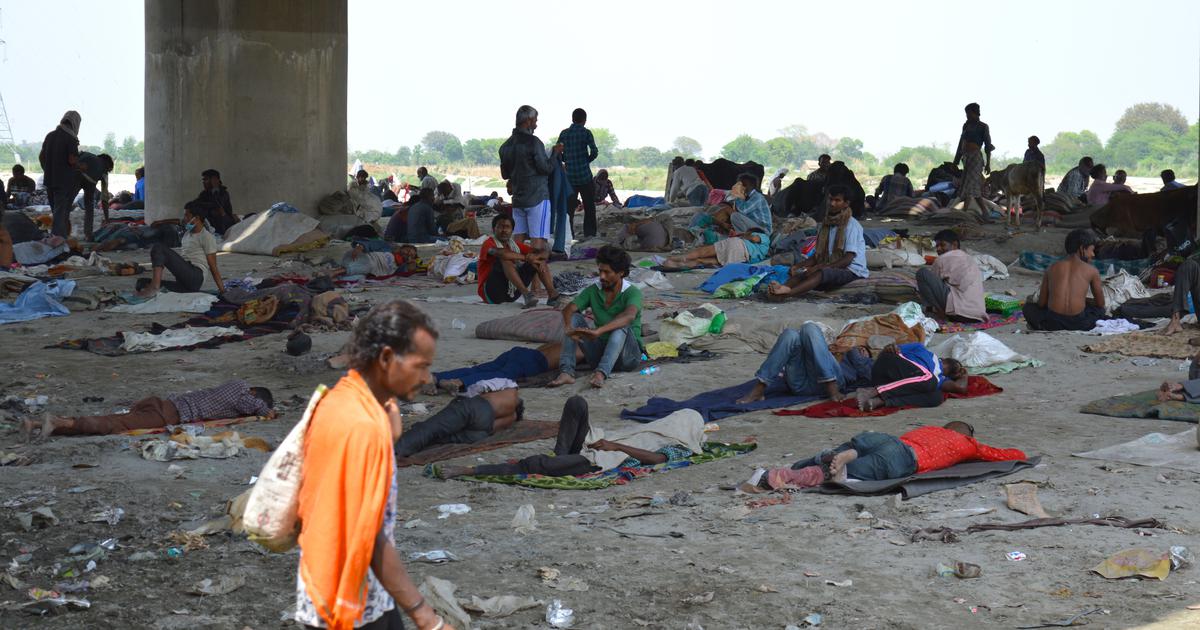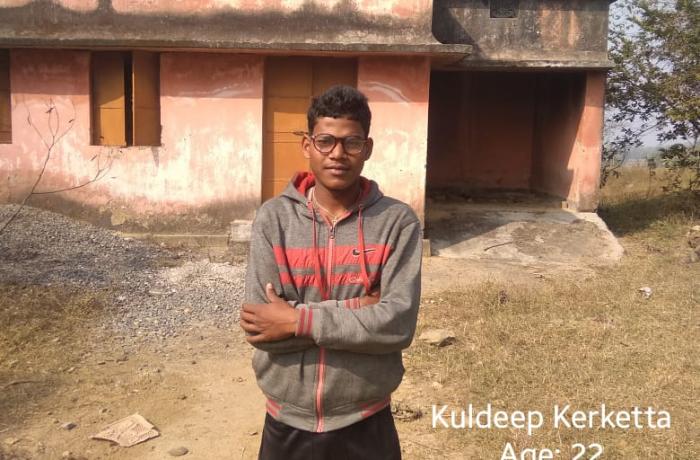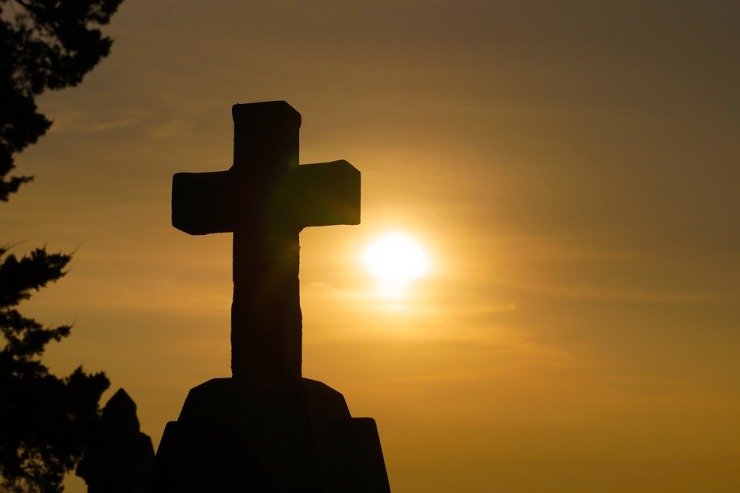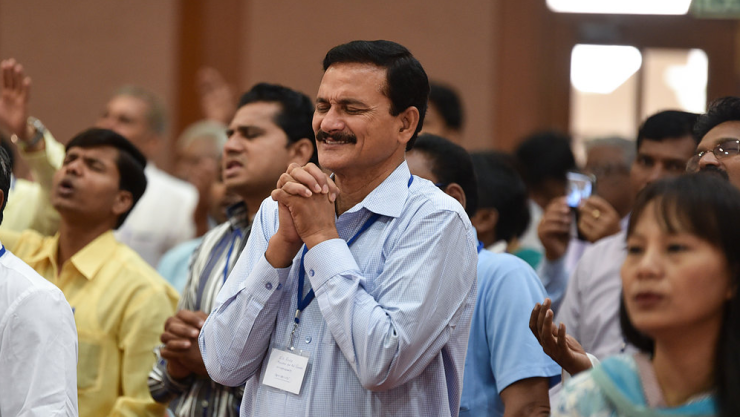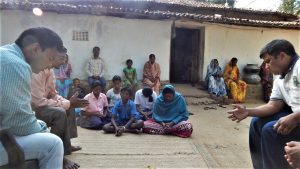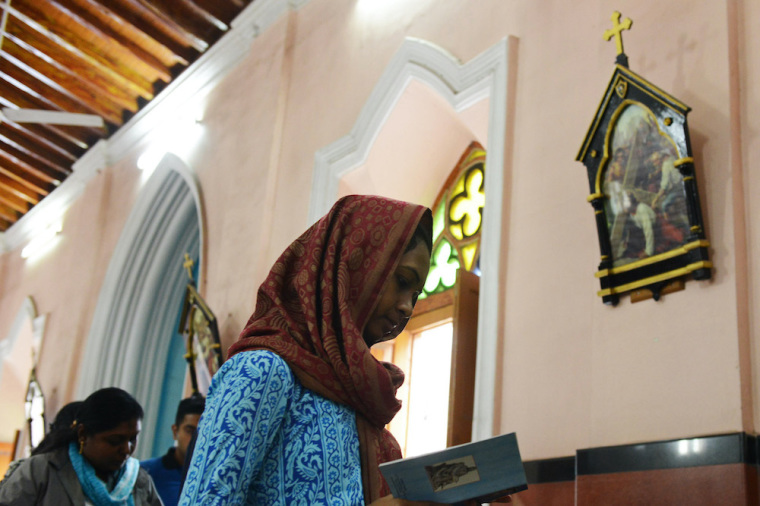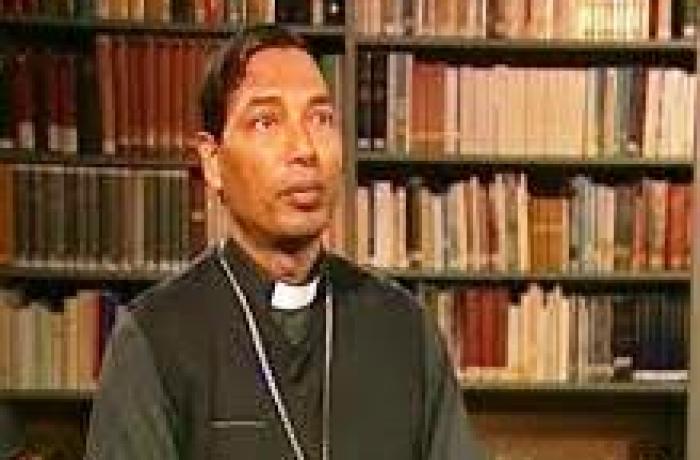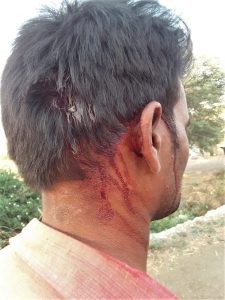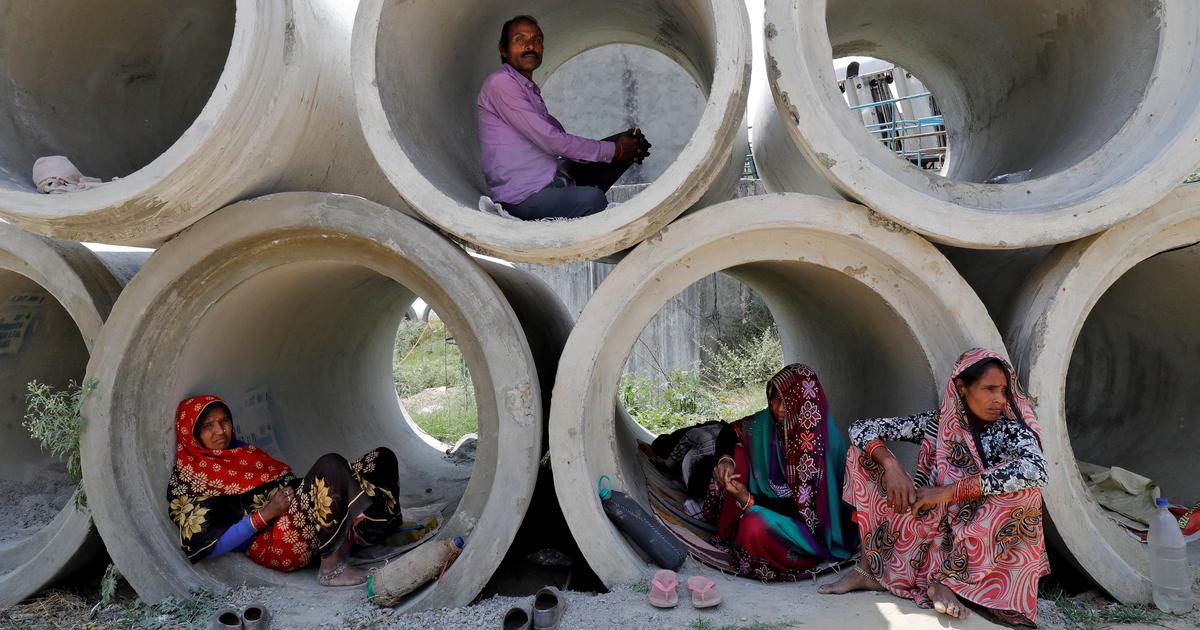Hell on the Yamuna as hundreds starved for days after Delhi shelters went up in flames
Migrant workers allege the administration stopped serving them food after shelters were set ablaze on Saturday. The banks of the Yamuna in Delhi have swollen up with men who cannot go home. On Tuesday afternoon, some lay curled over nothing more than a gamcha or cloth towel. A few guarded their bags and belongings by using them as pillows. Others had nothing on them apart from their clothes. Hundreds of these daily-wage earners are now confined to the garbage- and excreta-laden shores of the river near Kashmere Gate, less than 10 km from where Prime Minister Narendra Modi delivered a televised speech in the morning telling Indians why a three-week nationwide lockdown aimed at containing the coronavirus epidemic had to extended by another fortnight. These men are rural migrants who survived in the nooks and crannies of Old Delhi, picking up whatever work came their way – construction, plumbing, loading goods, pitching tents for events. But no one has earned a rupee since March 21 – the last day work was permitted in Delhi before the lockdown began. Their meagre savings have run out. With transport shut, they have no way to get back to their families in villages across North India. They
In Mumbai jobless tribal migrants risk hunger as a result of coronavirus
Indian Prime Minister Narendra Modi extends the lockdown on businesses and travel until 3 May. More than 120 million day labourers have become destitute all at once. “I thought I could help my family by coming to Mumbai to work. But now I have nothing,” said one labourer. The Pahunch charity has provided food parcels to 800 tribal migrants. Prime Minister Narendra Modi’s decision to lock down the whole country, closing businesses and banning travel, has created an army of poor people, forcing more than 120 million day labourers into destitution all at once. Kuldeep Kerketta, 22, is one of them. Originally from Odisha, the tribal man arrived in Mumbai last January, seeking work to support his mother, sisters and brother. "When the lockdown was announced, the factory shut down and I didn’t get paid. No salary,” he said. Now he is “homeless, jobless and hungry.” The lockdown came into effect on 25 March until 20 April, but Prime Minister Modi yesterday extended it until 3 May So far, India seems to have contained the pandemic. In total, the authorities have reported 9,756 COVID-19 cases with 377 deaths. However, many fear that the virus might reach the slums and the countryside. Once that happens, up
Mob disrupts Christian NGO’s food distribution in Uttar Pradesh
Some unidentified people on April 17 disrupted a Christian NGO’s distribution of food kits among those affected by the nationwide lockdown in western Uttar Pradesh. “We were distributing provision for about 3,000 families in Electronic City in the Sector 62 of Noida when a mob disrupted our work. Seeing the crowd the police asked us to wind up and we complied,” said Indian Missionary Society Father Joson John Tharakan, director of the Board for Research Education and Development (BREAD). The Noida-based NGO is managed by the Delhi province of the Indian Missionary Society. It supports some 40,000 school children in six states with education and meals. In view of the lockdown, BREAD decided to distribute 5 kg wheat flour to some 30,000 families living in Noida. They started the distribution on April 15 with the support of the Noida administration and the police, Father Tharakan told Matters India April 17 after the mob disrupted their work. “Seeing the crowd, the police told us that they might not be able to control them. So, they asked us to stop the distribution and move. As we were going to our vehicle, someone clicked photograph from behind us and tweeted it to the commissioner,” the priest narrated. The commissioner,
366 targeted violence and hate crimes against Christians in 2019: EFI report
As per the annual report published by the Evangelical Fellowship of India (EFI), as many as 366 incidents of violence against Christians, mostly related to physical violence, threats, harassment and the disruption of church services were reported in 2019. Reports from the Religious Liberty Commission (RLC), an EFI initiative, showed that hate crimes and targeted violence against Christians is worst seen in states like Uttar Pradesh and Tamil Nadu. RLC pointed out that Uttar Pradesh, the most populated state in the country, accounted for almost a quarter of all incidents against Christians. The Hindu YuvaVahini group, founded by Yogi Adityanath, is a Hindu youth militia that has been involved in communal violence and in targeting religious minorities. Following Uttar Pradesh, Tamil Nadu was the second worst place for Christians to be in. The state recorded 60 anti-Christian violence, which is traced to caste supremacist attitudes in villages and their linkages with political elements. RLC explained that most of the incidents recorded are related to physical violence, threats, harassment and the disruption of church services, by either religious radicals or the police. According to the commission, targeting Christian congregations on Sundays has become a trend across many states, especially in Uttar Pradesh and Tamil Nadu. Furthermore, many
Gunmen Shoot, Wound Daughter of Pastor Slain in 2015 in Eastern India
A gunman at the door of a Christian family’s home in eastern India on Thursday (April 16) shot the daughter of a pastor who was killed in the same house five years ago, family members said. Neelam Purty, 25, sustained bullet wounds in her thumb and thigh in the shooting she survived in Sandih village, near Binda village in Murhu Block, Jharkhand state, they said. “Is this the house of the pastor who was killed?” one of two men asked family members at the door at about 8 p.m., according to Purty’s sister, Sharon Purty. She said the men were trying to speak in the local Mundari dialect, but that it was clearly not their native language. They resorted to speaking Hindi, she said. “That pastor was killed, but you did not learn a lesson,” the men said as they shouted at family members at the door, according to Sharon Purty, who said they added. “You have continued assembling in large numbers for Christian prayers. Where is the woman working as spy?” The sisters’ mother told them that they were not spies and asked them to leave, Sharon Purty said. “‘Call the woman out, or we will kill you,’ they threatened us,” she said. One of the
Christians in India see dramatic increase of attacks in 2020
Indian Catholic devotees offer the way of the cross prayers after an Ash Wednesday service at Saint Mary's Basilica in Secunderabad, the twin city of Hyderabad, on March 5, 2014. | AFP via Getty Images/Noah Seelam Attacks on Christians and their places of worship in India continued to escalate in both number and severity in the early months of 2020, with 27 violent incidents reported in March alone. United Christian Forum in India, a Christian organization that advocates on behalf of Christians in India, documented 56 threats against Christians as well as 78 incidents of violence between January and March of 2020. According to UCF, these attacks took place in Uttar Pradesh, Chhattisgarh, Tamil Nadu, Odisha, Bihar, Karnataka, Madhya Pradesh, Maharashtra, Telangana, and Goa. In most cases, the attacks were perpetrated by mobs objecting to Christians holding worship services. On March 12, a mob attacked a pastor and his 6-year-old son because they were running a house church. The mob reportedly forced the pastor’s 8-year-old daughter to strip and threatened to beat her to death if she did not comply. On March 15, a mob of 300 individuals attacked a church service in Kunda Thana, located in India’s Uttar Pradesh state. There, the pastor of the church
Epidemic making things worse for Christian Dalits
For Bishop Sarat Chandra Nayak of Behrampur, "policies take into account the urban population, but the basic situation of the villages is never taken into consideration". A priest was arrested for breaking lockdown regulations; he was later released. "Our people are suffering a lot" from the coronavirus and the lockdown imposed by the authorities to fight the epidemic, said Bishop Sarat Chandra Nayak of Behrampur (pictured), speaking to AsiaNews. A priest for example was arrested recently for allegedly violating lockdown regulations. “Father Devendra Nayak, a Catholic priest in Mohana, was taken into police custody for crossing the street inside a Catholic parish compound,” the prelate explained. “He was going from the hostel to the refectory building for lunch when the police entered the compound and detained him for a few hours. The distance between the two buildings is only 30 yards and the priest was crossing the road inside the compound.” “I lodged a complaint with the additional district magistrate against the detention of our priest," said the Bishop. “The police entered the compound, despite claiming that they were outside.” Bishop Nayak heads the Commission for Scheduled Castes and Other Backward Castes. “In every situation, Christian Dalits suffer more marginalisation,” he explained. “Policies take into
Pastor in Central India Attacked for Police Report on Prior Assault, Expulsion
Tribal animists in central India who demolished a pastor’s house and drove him and his family out of their village in March seriously injured him in an assault this month, he said. After beating, choking and pelting pastor Lalu Kirade with a stone in the April 3 attack, the tribal villagers in Khandwa District, Madhya Pradesh threatened to destroy his vocal chords as one of the assailants put her foot on his throat, he said. “They had sprung on me like a pack of wild dogs,” Pastor Kirade told Morning Star News. “They told me to call upon my God to come and rescue me.” Among the assailants was the man who began the assault on him in March for refusing to abandon Christianity, identified only as Laxman. In the most recent assault, the six men and two women of one extended family ambushed the 29-year-old pastor as he returned from a grocery shop near the yard where his family is living under the open sky three miles from his former home in Bilood village, he said. They hit and kicked him, pulled his ears, dragged him by the hair and uttered profanity about Christianity and Christ, the pastor said, besides robbing him of rupees equivalent
India has the resources to care for its embattled migrant workers – but does it have the will?
It appears a government relief package of Rs 544 billion targeting migrants is sufficient but it needs to reach them immediately. The government’s decision on March 24 to declare a lockdown at four-hours notice to attempt to slow the transmission of Covid-19, banning all transportation betrayed a lack of understanding of the dynamics of migration in India. As has been documented in horrendous detail, the decision triggered a massive reverse migration. Since it was implemented without detailed planning, the lockdown put millions of low-skilled migrant workers in danger of starvation, subjected them to health risks and mental trauma as they lost the daily wages on which they depended for survival. Tens of thousands started walking back home with their families. But in many places, the police cracked down on them. As a result, many interstate migrants are stranded far from home, with no money or food. While India’s governments are usually very responsive to migrant workers stranded abroad (even arranging special flights to bring some home), the plight of millions of workers at home received attention only after the announcement of lockdown. Crisis foretold This reverse migration could have easily been anticipated. If Indian students, tourists, pilgrims stranded overseas want to return home,
The Federation of Indian American Christian Organizations (FIACONA) thanks the US Commission on International Religious Freedom (USCIRF) for recognizing the grave downward spiral of affairs in India despite India being a democratic nation
April 28, 2020, Washington DC. The fact that India prides herself as a democratic state makes it even more critical for her to behave like one respecting the fundamental rights of every citizens and not undermine any sections of the society. The President of FIACONA Mr. Koshy George said, “I am worried that the persecution of Christians and other religious minorities continues even during the Coronavirus lockdown and I am very disappointed with Prime Minister Modi for not condemning such behavior of his party cadre forcefully”. He further said, ‘I thank the USCRIRF for recognizing the real state of affairs on the ground in India and India’s downward trend in upholding democratic traditions’. Mr. John Prabhudoss, the Chairman of FIACONA thanked Commissioner Nadine Maenza for highlighting the specific national issues. He also wanted to know when will Rashtriya Swayamsevak Sangh (RSS) will be designated as a non-state actor in India? The Commission said in its report, “Throughout 2019, government action—including the CAA (Citizenship Amendment Act), continued enforcement of cow slaughter and anti-conversion laws, and the November Supreme Court ruling on the Babri Masjid site—created a culture of impunity for nationwide campaigns of harassment and violence against religious minorities”. FIACONA strongly recommends that the US government



